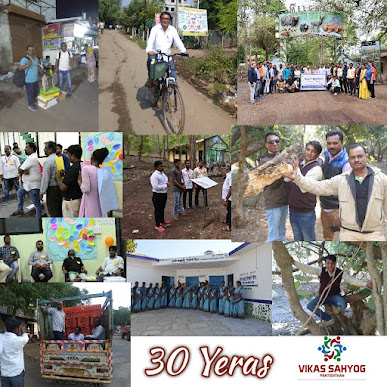Farryl Manek and Marmik Desai began their social internship at Vikas Sahyog Pratishthan (VSP) in February as a part of their MBA program at NMIMS, Mumbai. They had an opportunity to interview 2 women entrepreneurs of Sangrampur block in Buldana District of Vidarbha regions of Maharashtra.
Following is the experience shared by the students:
A Word with 2 Women Entrepreneurs of Sangrampur
-6th February, 2018
-6th February, 2018
As a part of that program, a few days back we had the pleasure of interviewing Usha Tai and Alka Tai, two women from one of VSP's Self-Help Groups in Vidarbha, who they had arranged to visit Mumbai for Pratibimb 2018. Pratibimb is VSP's annual exhibition-cum-sale organized by Rangoonwala Foundation India Trust, where they display and sell completely organic products produced by their various self-help groups and farmers in Vidarbha and other rural regions of Maharashtra. These women came from a small village called Bhon in the Vidarbha region of Mahrashtra. Bhongaon (Bhon Village) is located 522 km from Mumbai in Shegaon Taluka and is part of the Buldhana District of Maharashtra. It is a remote village and there is no railway station within 10km of Bhongaon, with the local bus running from Shegaon railway station to reach there.
Like many other regions in Vidarbha, Bhongaon has been neglected by the state government and VSP makes continuous and consistent efforts to ensure that regions like this receive help and support and become self-sustainable. This was Usha and Alka Tai’s first time here and they were positively thrilled to be here. VSP's objective was to take them to Pratibimb, so that they could interact with the customers first-hand and understand their point of view. The event would also give them exposure to selling directly to the customer and make them aware about the kind of problems they face.
These women mainly did farming in their village for their livelihood, with cotton being the main produce. Their day typically started with waking up early in the morning to walk 4-5 kms to get water for the day. Alka Tai’s farm was closer to the river but Usha Tai’s farm was quite far from the river and hence getting water for the farm was not an easy task. They also did cotton selling, animal husbandry, goat rearing(Goatry) and Poultry throughout the day. They also used to go to teach at the Aanganwadi (school) where there were 25 kids from age 3-6 years and 15 kids from age 7-12 years old.
They spoke about how VSP had reached out to them a few years and formed Mahila Bachat Gats (Women Self Help Groups) in their village. They were provided with goats to do goatry and have an alternative source of income, apart from farming. Initially they were given one goat each. They used to feed it chaara (grass) and soon the goats started reproducing. At one point, they had 3-4 goat calves. They sold off these and earned money from the sale. Apart from this, they also spoke about how VSP had also provided poultry in their village so that they could carry out poultry farming.
Usha Tai spoke about how water shortage was a big problem there and most of the times, their farms didn’t give sufficient yield to sustain their day to day life. Hence VSP had proven to be a huge boon for them because of their efforts to make an alternative source of income available in the form of poultry and goatry. She quoted an old Chinese saying – “Give a man a fish, and you feed him for a day. Teach a man to fish and you feed him for a lifetime” to drive home the kind of work VSP had been doing in these villages. They emphasized the fact that they were now becoming self-sufficient and also encouraging other women in their village to do the same. VSP has been a constant source of support for them by giving them not only the basic necessities but also educating them about the best practices in organic farming, poultry and goatry. As a result, they were now engaged in small scale organic farming practices and in the growth of tur, moong daal, wheat, udad and some vegetables in their garden itself. They used the produce for their day to day food and shared it with each other in the community and if some produce was still left, they would sell it off.
It was heartening to speak both these women and understand their issues and also to learn about the incredible effort that VSP has been putting in, in the areas of women empowerment, livelihood, education and soil and water in order to develop these villages and its people.





No comments:
Post a Comment